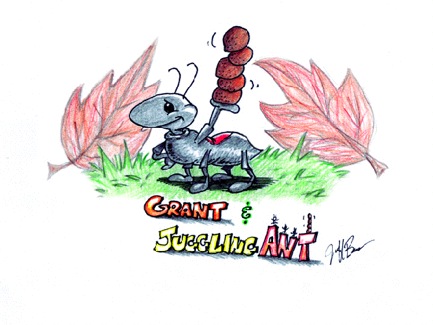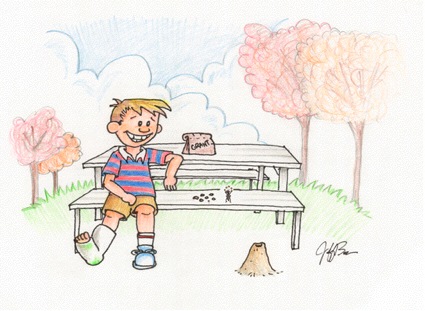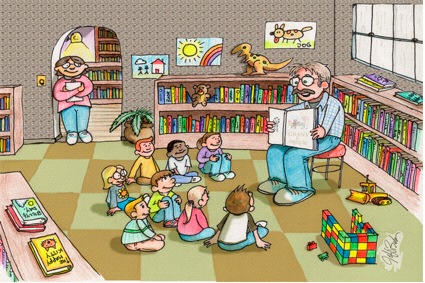Grant and Juggling Ant
by Cynthia DiSciullo and William Zigmont
Illustrations by Jeffrey Michael Bader

Grays and blues, compliments of a brisk, rainy autumn day, filtered through the library windows. At the request of the head librarian, Cynthia, her assistant, stepped through the tepid colors as she showed a mother and young daughter to the Children’s Reading Room. A crisp, clear baritone filtered out of the double-door opening, almost as if an invitation to listen. The trio was not the only ones who couldn’t resist. Parents lined the walls and children of various ages perched on multi-colored carpet squares leaned forward with keen anticipation as the man began to read.
The sprinkle-spackle of spring sunshine warmed everyone who ran, chased, jumped, hopped and generally played behind the Grove School. The little elementary school, with glinting windows and stout brick walls, housed grades kindergarten through five in the lovely small town of Dover, Delaware. Dover was a nice place to grow up. Quaint. Secure. Clean. It was a people-caring town with values and honor. People knew their neighbors and liked them. Children were safe to be children. That brought wide smiles to parents’ faces. You see, parents loved their children to be safe.
Not so far above the school, a white-throated sparrow dipped in its flight, gracefully landed on the field to one side of the playground, grabbed a brown blade of grass and fluttered back up into the spring air. Grant, a student who attended the small school, watched the bird fly into a tree hundreds of yards away. His blue eyes were captives of the short trips this black, brown, white and blue colored bird had been making to the field. Grant thought that it was most likely building a nest. He also thought it would be a great adventure to climb that tree to see the bird’s work. But he knew he could not do so.
The man smiled as he looked up. He had a pleasant face and gentle eyes, but it was the engaging smile that made many smile back. Cynthia, still in the doorway, found herself smiling as widely as the others. His head bent toward his notebook and a wisp of dark hair tumbled onto his brow. Ignoring it, he turned the page and continued.
Grant was a boy’s boy. Loved to run and could run faster and longer than anyone he knew, not on purpose, just couldn’t slow himself down. It was as if he was blessed by the legacy of Mercury’s winged feet. He loved to roll in the grass as well, tumbling over and over as the sky turned upside down and the earth switched places with clouds and sun. He climbed everything he could, too. Not just trees, but rocks and fences and garage doors. Knew every game and sport his friends liked to play from baseball and soccer to basketball and football, including everything in between, even extraordinary games like walking the curb. He was good at playing. And when he did, the boy smiled. A bright, wide winsome smile that told everyone it is fun to be a boy.
Fun to be Grant.
Fun.
Adults said he was a natural athlete. Grant agreed all kids found play natural. Yet, Grant had an awareness that something special existed inside. He could do things others could not. It didn’t make him feel strange, but sometimes he felt alone.
Three weeks ago while running, he stepped into a hole and hurt his leg. Broke it. Now he wore a plaster cast and hobbled as he walked. He kept his smile, but it wasn’t as bright. He loved to play all the games. All of them, and not one could be called his favorite. Yet, there was no game he could play, today. Now, he had to sit and watch.
He knew he was good at chase and catch.
But watched.
Good at field ball.
Had to watch.
Fabulous at kick the pretend puck.
Watched. Not as good at watching as playing.
While the man turned the next page Cynthia pointed at a pair of open seats and the mother and daughter sat. Cynthia knew work called, but instead she leaned back against the doorjamb and listened.
It was lunchtime at his school. He sat and watched his friends run and throw balls. Screams of play echoed off the brick school walls. These most recent weeks he had to sit and watch. This was a struggle for a boy who never liked to watch. A struggle.
The smallest things caught his attention. The sparrow today was one. A wind-tousled piece of blue paper yesterday whirled for ten minutes as Grant watched. He nearly fell off the bench following its path, trying to guess where it might land. It didn’t. It finally blew out of sight. Wasn’t much of a game.
Today’s lunch was the same as yesterday’s lunch. A cheese sandwich. A red apple. Two pecan cookies. And milk. He noticed that he had left some crumbs on the bench where he had put his cookies. Walking toward those small specks of food was an ant. The ant did not go directly toward the crumbs, but first went left, then right, then backed-up, then left again. Grant was curious if the insect would find the crumbs and watched carefully as it found its way across the bench.
Cynthia found herself smiling once more as she scanned the room. She couldn’t remember the last time she saw children so quiet during story time. The man had a way of captivating their minds with not just the story but with every intonation. She watched the eyes of the children absorbing all the words, nearly gobbling them and eager to lap up the next syllable. She also studied the facial gestures of the man and her lips spread a little more. He was into the story as much as the listeners. She liked that and found herself as anxious as the children to hear the next words.
The ant was black in the way of ants being black. However, this particular ant had a very unusual trait. It wasn’t just an ordinary ant. It had a distinctive bright red spot on the big back part of its body. Grant had never noticed that spot on any other ant before. It appeared to be a little larger in size than most ants, too. Its antlers, as Grant called them, moved independent of each other.
Grant laughed when the small bug stopped, rose onto its back legs and waved its left antenna. Grant waved back.
“Hi, ant,” he said.
The spotted insect seemed to look at Grant for a tick and tock, then it returned to its feet, and continued its journey. Within seconds it discovered the cookie’s leftovers. It seemed to taste one of them, and then it tried to gather the few that were close. During this time Grant had positioned himself on his stomach on the bench to watch the little ant. He bent the knee of his good leg, sticking that foot into the air, but the leg with the cast remained rigid and stuck straight out.
This ant had figured out that the crumbs were a good treasure. Grant assumed it wanted to collect them and take them back to its home. Being careful not to touch or scare the insect, Grant slowly pushed the crumbs into a tighter pile. He thought it would be easier for the ant to handle.
The ant tried to gather up five small crumbs. Two were easy for it to hold. The third seemed to present a problem. The fourth piece caused the first two to fall back onto the bench. The insect tried to pick up the five pieces again, but the result was the same, the pieces fell from its front arms. The third time was no different than the first two efforts.
The man glanced up. Another smile stretched over his face. “Our ant has a problem.”
Several small heads nodded in affirmation. Some young faces looked concerned.
The room reverberated with the sound of a turning page and the story unfolded.
Today, Grant discovered ants could have extraordinary talent. His dad said that about Grant. The boy, though, did not feel extraordinary. Did the ant feel extraordinary, he wondered as, wide- eyed, he watched the amazing ant. The bug stood upon his back legs and with the other four the small hunter picked up the five crumbs and began to juggle them. Keeping two or three in the air at all times thus being able to carry them all. Grant smiled at this strange act. An extraordinary act indeed.
“Wow!” he exclaimed with a low voice, feeling a sudden bond with the ant. It, too, could do something others could not.
The insect, like a trained show-dog walked on its back legs across the bench. It successfully maneuvered itself onto the ground and slowly moved through the spring grass still juggling the pecan cookie pieces. Grant slowly followed the ant astonished as only a curious boy might be watching the bug keeping several objects in the air and in motion at the same time by alternately tossing and catching them.
“Juggling,” Grant whispered. “It is actually juggling.”
The spotted juggler stopped at a small hole in the dirt. He dropped the crumbs. Seconds later, five small ants appeared. Each had a red spot on the large part of its body. Each small ant grabbed a crumb then walked back into the hole. The juggler started back toward the bench. Grant followed dragging his plaster cast through the grass making green marks on the cast’s surface. Minutes later the ant found the crumbs again. He did the same juggling act and again, started to walk back toward the grass.
The school bell rang and Grant had to return to school and his afternoon classes. He began to collect the trash from his lunch. Noticed a few crumbs were in the wrap from his cookies. He spilled them onto the spot that ant had first found then walked toward the school.
“Have a nice lunch, ant,” he said as he awkwardly walked off turning twice to look back.

Cynthia couldn’t stop smiling. She noticed many of the parents held the same expression. Whereas the children seemed to be utterly absorbed, smiles adorned their faces but not in the same way as the adults. The younger faces had that whimsical tilt of lips, that eager gaze of absolute and unreserved captivation. Was it the man’s gentleness so obvious in his storytelling that enthralled so completely? Or was it the words, so perfectly mated to a child’s thoughts? Considering he read from a notebook, she knew him to be the author. She liked his creative mind almost as much as she liked his reading.
After a sip of water from a nearby bottle, his voice snipped the silence of the room. Not even the small rapping of rain against skylights and windowpanes drew anyone’s attention from his voice.
The next day when Grant returned to the bench to have his sandwich, apple, milk and cookies, he noticed that right there sitting on the bench, actually looking as if it were waiting, was the spotted juggler. Grant laughed, a clear, delightful laugh that would have been contagious if any other children were near. He opened his brown bag and grabbed the cookies, crumbed off some pieces. The insect almost instantly snared them and again began to juggle. It returned to the grass. To the same hole and there were the same smaller and spotted ants waiting.
The word family flashed in Grant’s mind, the word and the realization that the juggler might be a parent feeding its family. It was a swift, tender wisp of a thought that vanished before it could be fully caught. Yet, Grant continued to smile.
This lunch partner visited with Grant every school day while Grant wore his cast.
Grant made certain he had cookies every one of those days. He’d always save one in his book bag just in case his lunch lacked a cookie. That happened occasionally. Moms sometimes thought that maybe a certain day was not a cookie day. That was simply the way Moms thought.
It was Tuesday when he had his cast removed. It felt strange at first, and he hobbled some without the bulky, plaster support. The doctor told him he could start to play but could not climb for a while. Unmistakable joy seemed to loosen from the inside out of the boy when he smiled.
Though Grant would eat his lunch everyday quite fast like he did before his broken leg, he’d make certain his juggler friend got his cookie-crumb lunch. Only then would he run off to play with his friends. Somehow it made Grant feel good. He never told anyone. Just fed this family of spotted ants.

“The end,” said the man. The room gave him a short applause. He smiled and thanked them. “I am glad you liked Grant and the Juggling Ant.”
Several children laughed at the reminder of the title. The story made Cynthia feel quite good inside, just like Grant but not quite certain why. She turned and left the room almost bumping into Marian Turner, the head librarian and her boss. She had been standing behind her.
“Excuse me,” said Cynthia. “Did not know you were there.”
“No problem. I see you liked that man? He is one of the good people. The children find him wonderful,” said Marian Turner.
“I can see that. He has an engaging way. He reads kindly.”
“Writes that way as well. That is his own story that he read.”
“I had gathered,” Cynthia said, indicating the notebook with her chin. “I like his style, especially in this story. I like the way Grant finds his humanity at such a tender age and how he continues to feed the ant family much like the way this author nourishes the children with his words, feeding them the joy of reading.”
Marian nodded. “That is exactly it. He’s special that one.”
Cynthia gave a backward glance at the man, watching as he spoke softly to a child and his father.
Saying nothing more, she headed back toward her desk.
Marian smiled that cat that ate the mouse, cricket, spider and canary smile as she looked at the young women walking away, then at the man. In a low voice, almost under her breath, she said, “And sometimes a boss has to feed a workaholic assistant the possibility of a social life.”
The woman who Cynthia had shown to the reading room gave Marian a conspiratorial grin. “Hey sis, they do look like they’d make a nice match.”
Postscript for Grant and Juggling Ant:
DiSciullo asked, “Are there any black ants with a red spot in Delaware?”
“Must be,” replied Zigmont.
“Is that a must be that you know or a must be that you are guessing?”
“Dag, you are doggin’ me,” After a pause and with a canted eyebrow, “In this case antin’ me.”
“Well, which?”
“Don’t know.”
“Let’s contact the Ant Guy.”
“Who?”
“The famous Ant Guy. There’s a fellow, a University of Delaware graduate, who is writing the book, Ants of Delaware. He’d know.”
“Call him.”
“Did.”
“Okay. So you asked me a question you already knew the answer.”
“Your point?”
Frustration filled Zigmont’s face, “Okay... what’s the deal?”
“I called Shawn T. Dash on November 7, 2006 and asked if our ant was indigenous to Delaware. He’s presently at the University of Texas.”
“The ant?”
“No Dash.”
“And?” Zigmont replied drawing out the question’s word.
“Well the entomologist said, ‘There are no ants in Delaware with a red spot, however, there is a carpenter ant with a black butt, red head and red legs, called camponotus-chromatids.’”
“Let me see. Your research has proved that there could be?”
“Exactly!”
“F-ant-tastic!” A crooked smiled followed his comment. “Did Doctor Dash believe they could juggle?”
“I am confident that the ant man did not believe our ant could juggle though they were very strong, dexterous and talented.”
“No juggling.”
“Maybe juggling.”
“F-ant-tastic! I had ant-icipated that ant-swer. Hoping that c-ant-ankerous ant could prove such ant-ics.
“Enough... Enough cut the b-ant-er.”
About the Illustrator:
Jeffrey Michael Bader, a twenty-five year old lives in Lewes, Delaware and works as a graphic artist and illustrator, educated at the University of Delaware. Growing up, Jeffrey was the kind that instead of coloring in coloring books he would draw his own. He presently has a ten-year old brother, Trey, who loves to watch his older brother draw. After making a few books for Trey and subsequently seeing how happy it made him, Jeffrey soon grew a passion to illustrate more books all for the want to bring joy to other children.
Story copyright © 2007 by Cynthia DiSciullo
and William Zigmont
Illustrations copyright © 2007 by Jeffrey Michael Bader
